
Author: autumn
MSG
Starbucks
Peppermint
Canned Foods

Canned foods can be a lifesaver for busy weeknights, for making fewer trips to the store, and meal prepping. They’re conveniently packaged goods with an extended shelf life and can be stored outside the fridge or freezer until opened. This makes canned foods including fruits and vegetables a convenient long-term option to fresh or frozen produce.
Plus, all kinds of food come in a can these days, proteins, veggies, beans, fruit, and more. You can stock up on them and use them when you have limited time to prepare a meal at home! Of course, there are certain considerations when it comes to canned foods which we will discuss below.
Is Canned Food Safe For Pregnancy?
Here’s the deal. Like plastic, most canned food contains an epoxy liner that has the chemical Bisphenol A (BPA) as part of its composition. Unlike food additives, this chemical won’t be found on any ingredient list since it is not intentionally added, but unfortunately, BPA can still seep into the food within the can. Even organic foods (including canned veggies and beans) can still contain BPA unless otherwise specified that they do not.
This chemical is an endocrine disruptor known for causing children’s reproductive, cognitive, and behavioral issues. Some studies show that pregnant women’s consumption of BPA can transfer to the growing fetus and have negative effects on the baby’s future development (1). BPA exposure in-utero has been associated with child obesity, reproductive complications, early puberty in girls, depression and anxiety, diabetes, and heart disease (2, 3).
In studies with mice, BPA has been associated with decreased glucose tolerance, which is often a risk factor for diabetes and is thought to suggest that BPA can increase the risk for metabolic disorders (4).
Studies have also found that higher BPA exposure during pregnancy has been associated with an increased risk of preterm birth, and increased exposure in the third trimester can make women especially vulnerable to preterm birth (5).
In conclusion, we should avoid high levels of BPA, if possible. Unfortunately, this includes the convenient range of canned food available. Unless the can specifies that the product is BPA-free, it won’t be 100% free from this toxin.
What about BPA-free canned food?
The good news is, many companies are now making BPA-free cans, and they typically advertise this right on the label.
However, canned food is still not always the most ideal option to eat every day when pregnant! Buying fresh and frozen will be your safest choice for both you and your growing baby. Still, you can check the labels of different brands of canned food to see if they have BPA-free alternatives.
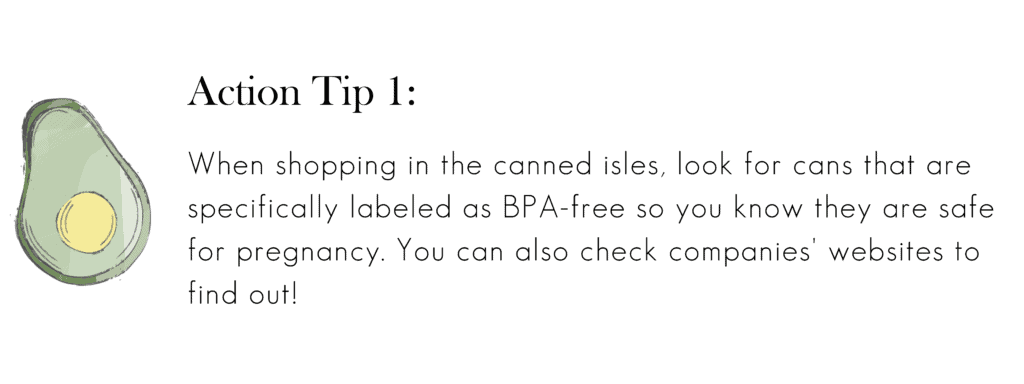
For example, the below screenshot is from the LaCroix website:

Can canned food have any benefits during pregnancy?
If you are consuming BPA-free canned foods, they can often be an easy source of nutrients. Canned foods are often more affordable than fresh food, are not perishable, and can last in your pantry for months to even years. Canned foods can save time, as they can often be eaten right from the can, or heated in the microwave. Studies have found that people who include canned foods in their diet often have a higher intake of nutrient-dense foods such as fruits and veggies, protein-rich foods, and 17 different essential nutrients (6).
This may be because canned foods offer a variety of these foods readily available, for people who would not otherwise always be able to consume them. If you are someone who benefits from having a pre-cooked, ready-to-go meal or snack option due to time constraints, smell, and food aversions that are worsened by cooking, or simply enjoy the convenience option, BPA-free canned foods can be a viable and nutritious option during pregnancy.
BPA-free canned foods that can be beneficial to include during pregnancy include:
- Canned veggies: mixed veggie blends, green beans, diced tomatoes, green beans
- Canned fish: sardines, salmon, light tuna
- Canned smoked oysters
- Canned white crabmeat
- Canned chicken breast
- Canned roast beef
- Canned beans
These are all viable options for canned foods that can help supplement your diet, but they should never be the main source of nutrients.
Next are some tips on how to decrease the use of canned foods during pregnancy!
Buy fresh or frozen instead of canned.
Fresh food is, of course, a great option, so try to get as many goods, including fruits and vegetables, as fresh as possible. This will ensure your meals are made with the most real food ingredients and minimal preservatives as well.
Frozen is the next best option, and sometimes better than fresh foods since it lasts longer. Frozen produce doesn’t require the same additives and chemicals, like BPA, as canned foods. Nowadays, a lot of food is available frozen and is just as convenient as canned goods!
Choose alternative packaging.
Produce comes in many different packages, not just canned. While this might be the most affordable option, the risks don’t make it the best bang for your buck! The most popular alternative packaging is glass. You can see milk, juices, tomato paste, olives, fruit compote, and many other goods come in this format. Paper goods might not be as available as glass, but it’s a fantastic choice whenever you can find them. Plastic (when free of BPA) is a more widely available option with soups, beans, and even pasta meals ready to buy at the nearest store.
Go shop at the local farmer’s market.
There’s nothing like picking your own food right from those in charge of making it! Farmer’s markets are a fun activity and convenient, allowing you to get the best of both worlds. Enjoy lots of socializing, great prices, local foods, and peace of mind regarding what’s feeding you and your growing baby. You can ask any questions about how the food is grown and avoid canned goods while doing it!
Cook most of your meals at home.
Many people already cook their meals at home during pregnancy to avoid food poisoning or because of other dietary restrictions, however, cooking your meals at home also ensures that canned goods aren’t being thrown into this mix without you actually knowing.
Some restaurants may use canned foods to save money on their end. Cooking at home ensures you are in charge of the whole process from the grocery store to your plate. To further avoid exposure to BPA, buy fresh or frozen produce and put together healthy dishes at home!
Grow your own food at home.
This one might sound a bit overwhelming or time-consuming, especially if you don’t have a green thumb, but growing your own food can be truly rewarding! Not to mention it’s fun, super healthy, seriously fresh, and allows you to avoid canned goods and potential food safety issues.
And, remember, you don’t need to go crazy. It doesn’t have to be the entirety of your pantry and produce stash. You’ll be fine with starting a small fruit and vegetable plot and growing a few seasonal foods, or even just fresh herbs and leafy greens. With time, you’ll gain experience and be able to grow your selection plus maybe a new community.
The Bottom Line
- BPA is a chemical that is found in the liner of most canned foods unless it is labeled as BPA-free. Unlike food additives, this chemical won’t be found on any ingredient list since it is not intentionally added. Even organic canned foods can still contain BPA unless otherwise specified that they do not.
- BPA is best limited during pregnancy, as it can be transferred to the baby and negatively affect future development.
- Canned foods do offer some benefits during pregnancy, such as nutrient-rich foods that are ready to eat. If you have time and/or budget constraints or smell and food aversions, BPA-free canned foods can be a viable and nutritious option during pregnancy
- Alternatives to canned foods include fresh and frozen foods, shopping at a local farmer’s market, cooking meals at home, and growing foods at home.
Written by: Ryann Kipping, MPH, RDN, and Claire Gilmore, MSCN, CNS, LDN
How to Pick a Cereal
Hemp Seeds
Sardines
Nutrition for Skin Health
Smoothies
Broccoli
Salmon
Aversions
Cravings
Peanut Butter
Papaya

Papayas are a sweet tropical fruit native to Mexico and are now grown in many parts of the world including India, the Caribbean, and Florida. Papayas have a brightly colored orange flesh that is super tasty and used in a variety of desserts, smoothies, and salads around the world.
Is papaya healthy?
Papayas are loaded with nutrients and antioxidants with documented health benefits. For example, papayas are high in vitamin C, E, K and beta-carotene (1).
Here’s a quick look at the nutrition facts for 1/2 cup of raw papaya (2):
- Calories: 31.2
- Fat: 0.2 g
- Sodium: 5.8mg
- Carbohydrates: 8g
- Fiber: 1.25g
- Sugars: 5.5g
- Protein: 0.35g
- Vitamin A: 34.1mcg (promotes eye health!)
- Vitamin C: 44.15mcg (vital for our immune system!)
- Folate: 53.6 mcg
While papaya has plenty of healthy nutrients, like other tropical fruits, ripe papaya is very high in fructose (fruit sugar). Like all sweet foods, papayas should be consumed in moderation!
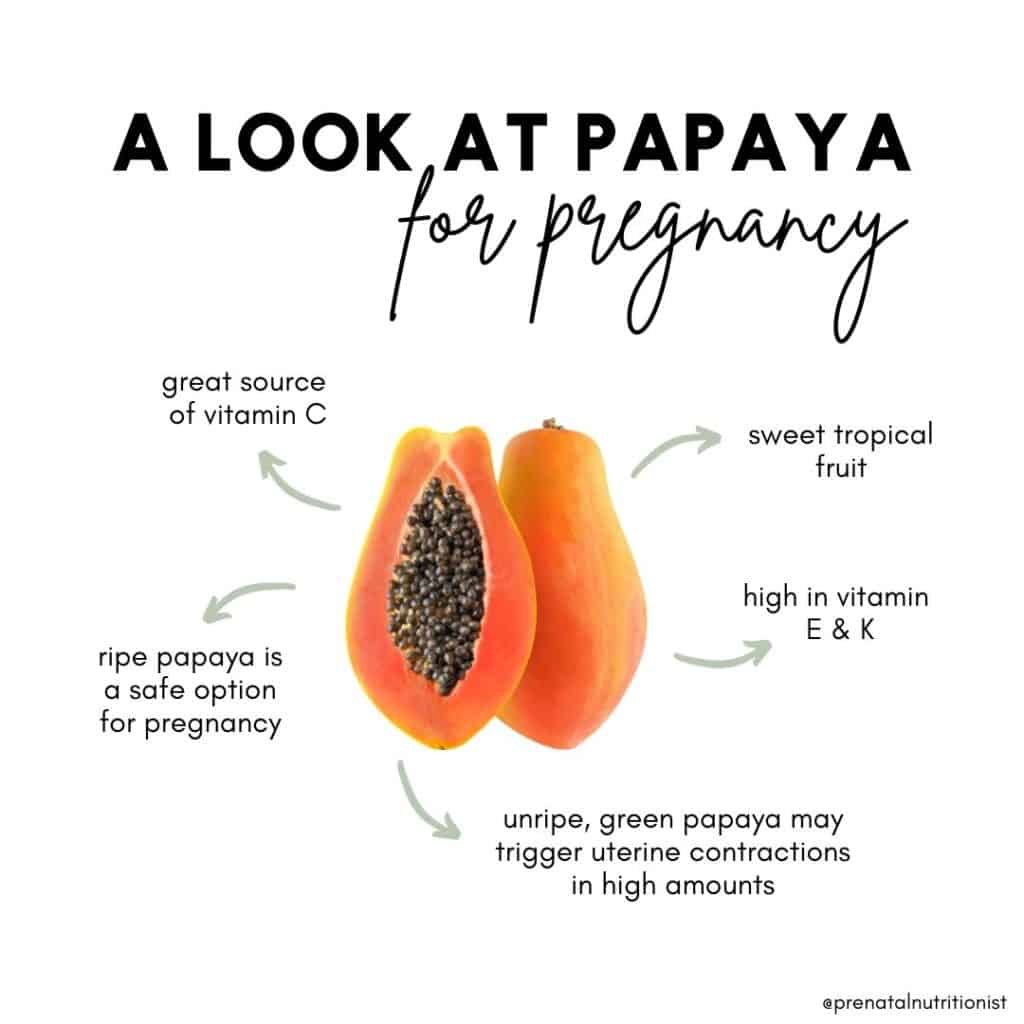
Is papaya safe for pregnancy?
Ripe papayas are fine to consume in small to medium size portions (think 1/2 cup serving size). However, a semi-ripe or unripe papaya contains a substance called latex, which has been reported in small studies and animal studies to trigger uterine contractions (3).
The papain content in the latex is also known to increase chances of embryotoxicity and weaken the vital membranes of the fetus (4). As such, unripe or semi-ripe papayas should be avoided during pregnancy although small amounts are probably safe (4).
Papayas will ripen more quickly when put in a paper bag with ethylene-producing fruits, such as apples or bananas. Stay away from green skinned (raw) papayas.
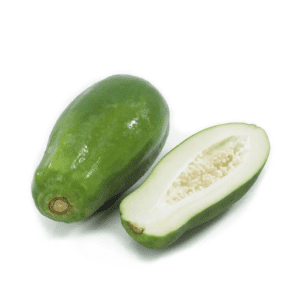
This is an unripe green papaya!
 Can I eat papaya if I have gestational diabetes?
Can I eat papaya if I have gestational diabetes?
Pregnancy is a naturally insulin resistance state meaning it’s easier for you to get high blood sugar levels compared to when you’re not pregnant. Monitoring blood sugar is especially critical if you’ve been diagnosed with gestational diabetes.
Unfortunately, papayas are pretty high in sugar (fructose) which means they will cause an increase in your blood sugar even though they come with plenty of awesome nutrients. For this reason, it is recommended to limit the consumption of papaya and other tropical fruits like bananas, mangoes, and pineapples.
One serving (~½ cup) of papaya equates to 8 grams of carbs which counts for half of a “carbohydrate exchange” or portion (5). Everyone’s carbohydrate needs are different and the amount of carbohydrate grams you should eat per day should be individually determined with your dietitian. For most people, 1-2 servings a day of fruit is still okay!
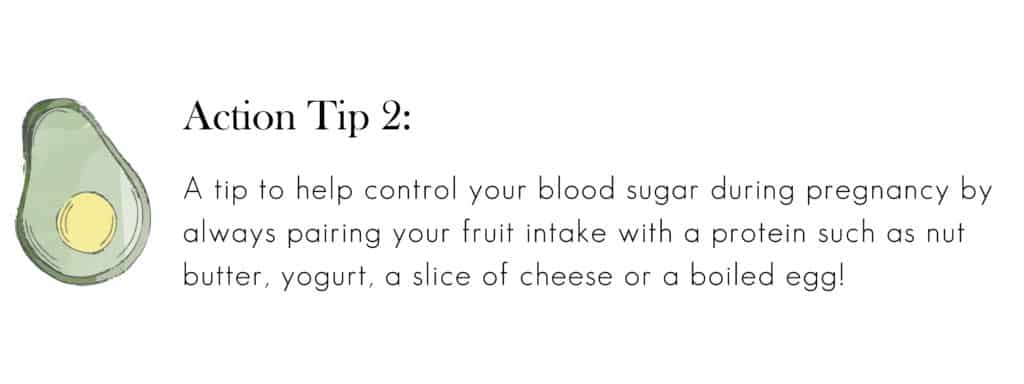 How does papaya impact gut health?
How does papaya impact gut health?
Papain, a proteolytic or digestive enzyme found in papayas, is potentially helpful for digestion and our gut health because of the way it helps break down food proteins (6). Some people find papaya eases indigestion and helps with constipation.
However, it is not recommended to take papain in supplemental form. If you have more questions about digestive enzymes read this note!
Are there other fruits that should be avoided during pregnancy?
For the most part, fruit is a safe and healthy option for pregnancy. In general, fruit is high in antioxidants, water, fiber, vitamin C, and more. You may have heard it referred to as “nature’s candy” due to its typical sweet taste that we love.
Pineapple and grapes are two other fruits you may have heard should be avoided during pregnancy – these are myths. Learn more about pineapple in this note, and grapes in this note. Lastly, dates are a popular topic when it comes to prenatal nutrition– learn all about dates here.
If you are struggling with blood sugar imbalances or have been diagnosed with gestational diabetes, fruits that are “low glycemic” meaning foods that lead to a smaller increases in blood sugar are your best bet. These are fruits typically found outside of the tropical fruit category. Think raspberries, blueberries, blackberries, apples, and pears. All of these fruits are lower in fructose and may be less likely to spike blood sugar and cause side effects associated with diabetes (7).
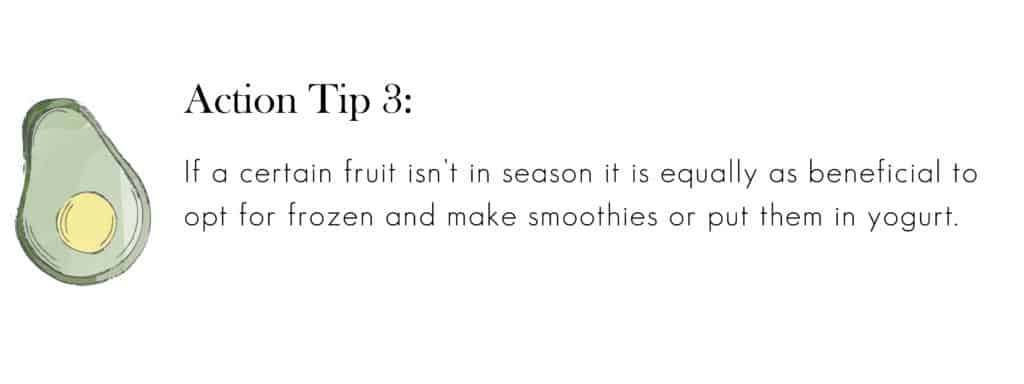 If you are craving papaya or are a big papaya fan try this smoothie below!
If you are craving papaya or are a big papaya fan try this smoothie below!
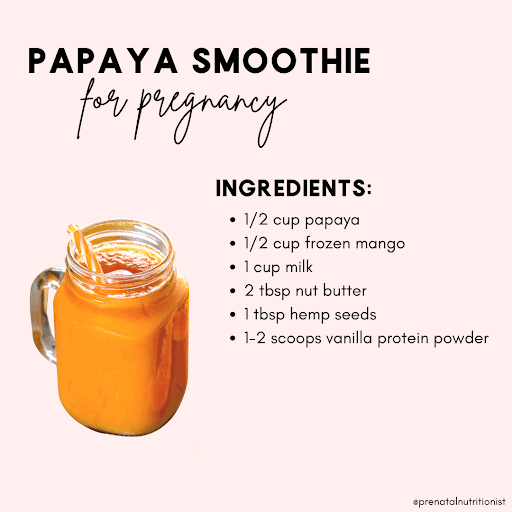
The Bottom Line
- Ripe papayas along with other fruit are fine to consume in typical portions during pregnancy.
- Note of caution – a semi-ripe or unripe papaya contains a substance called latex, which may trigger uterine contractions in high amounts.
- Papayas are high in sugar (fructose) and if you have been diagnosed with gestational diabetes, limit the daily intake of papaya and other tropical fruits like banana, mangoes, and pineapples to about a cup per day.
- If papayas are one of your favorite fruits, try blending it in a smoothie with some nut butter and protein, or eat it in some creamy yogurt.
Written by: Clare Viglione, MPH, RD and Ryann Kipping, MPH, RD
Decaf Coffee
Poppy Seeds

What exactly are poppy seeds? Where do they come from?
Poppy seeds are “oilseeds,” harvested primarily for their high oil content, and used as a spice in and on top of many popular baked goods and pastries.
Poppy seeds are from the opium plant, the same plant that is used to produce heavy duty pain relievers like morphine and codeine (1). Eating too many raw poppy seeds can even cause you to fail a drug test! (2)
How are poppy seeds typically used?
They are ubiquitous in baked goods like poppyseed muffins, cakes, bialys and bagels (ever heard of the Montreal-style poppy seed bagel!?). Unwashed poppy seeds, not the kind found on supermarket shelves, harbor the opium compounds that can induce the same chemical effects as morphine. PSA – unwashed/raw poppy seeds can be dangerous and should not be consumed!
Are poppy seeds healthy?
Poppy seeds, like other seeds and nuts, are generally a good source of plant antioxidants and nutrients like manganese and calcium. In 3.5 ounces of poppy seeds, you’ll get about 12% of your daily calcium needs and 30% of your manganese needs (3). Manganese is a trace element important for bone health and blood clotting and also facilitates the uptake of amino acids, fats, and carbs. For the general adult (non-pregnant!) population, poppy seeds are fine to consume in the small amounts we typically come across in baked products.
That said, poppy seeds are disproportionately high in omega-6 fatty acids compared with the amount of omega-3, and this imbalance has been found to lead to inflammation and ultimately cardiovascular disease (4). As such, you shouldn’t consume large amounts of poppy seed oil.
Healthy fats (like avocado or olive oil!) are extraordinarily beneficial for our health and especially crucial for fertility, pregnancy, and healing postpartum. Check out our notes on fats and omega 3-fatty acids!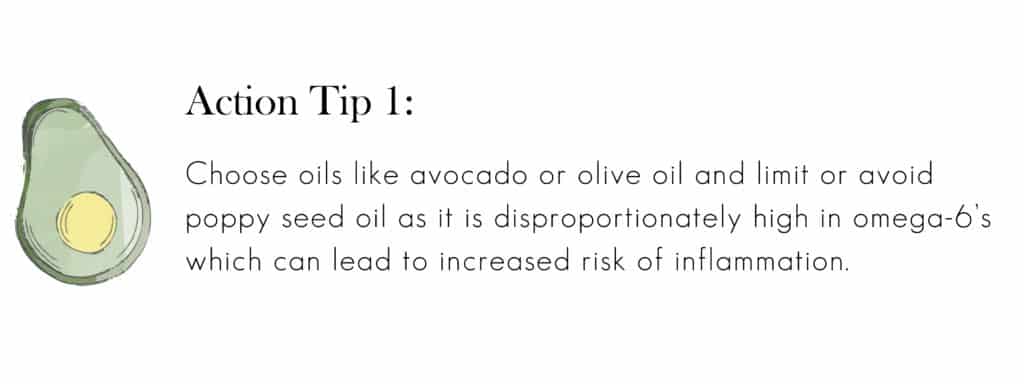 Are poppy seeds safe during pregnancy?
Are poppy seeds safe during pregnancy?
High amounts of poppy seeds could pose risks to both the mother and the baby because of their potent opium compounds (5). However, the amount of poppy seeds in foods such as bagels and muffins is super small, not raw seeds, and should be fine for consumption. Poppy seeds that are used for baking and cooking are regulated and go through a rigorous washing and procuring process to get the opiate residue off as best as possible.
Don’t forget to always ask your doctor these important questions about introducing new foods during pregnancy. Some resources suggest avoiding poppy seeds 3-4 weeks before baby arrives in the instance it shows up as opioids in blood work, this is common in the urine screenings, however, modern medicine should be able to detect the difference between poppy seed consumption and drug use.
Overall, since we don’t have much research on poppy seeds in pregnancy, it’s best to approach eating them with a little bit of caution. Daily intake of raw poppy seeds or poppy seed tea is a no-go, but baked goods and treats with poppy seeds added are okay. Additionally, avoid any poppyseed products in supplements or OTC medications, etc. 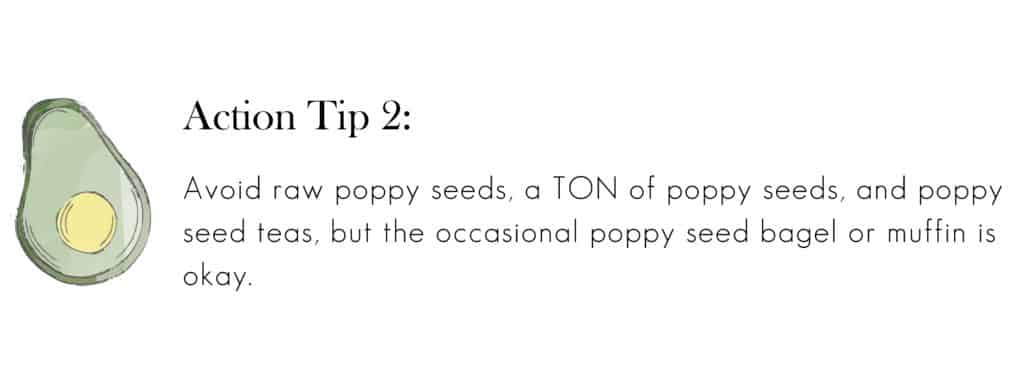
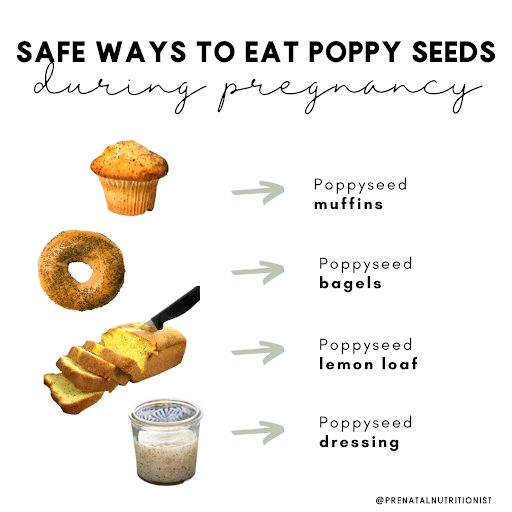
Will poppy seeds affect fertility?
All seeds have fiber, nutrients, and other plant-based compounds like antioxidants that may theoretically enhance fertility and chance of conception – but we don’t have research on poppy seeds and fertility specifically to support this (6)!
Fun fact: Age-old medical wisdom says that flushing fallopian tubes with poppy seed oil to clear excess mucus will greatly enhance conception. This ancient medical technique sounds strange, but researchers have actually replicated this in 2018 and found that the women who had their tubes flushed with poppy seed oil (not just any type of oil or liquid!), clearing the blockages that prevented eggs from implantation, were more likely to conceive successfully in the months following the procedure (7). This practice is not used widely but may be adopted by fertility specialists in the coming years!
Can poppy seeds be used in seed cycling?
Poppy seeds are not used to replace the traditional “seed cycling” seeds – flax, chia, sunflower, pumpkin. If you’re curious about seed cycling to boost fertility check out our note here.
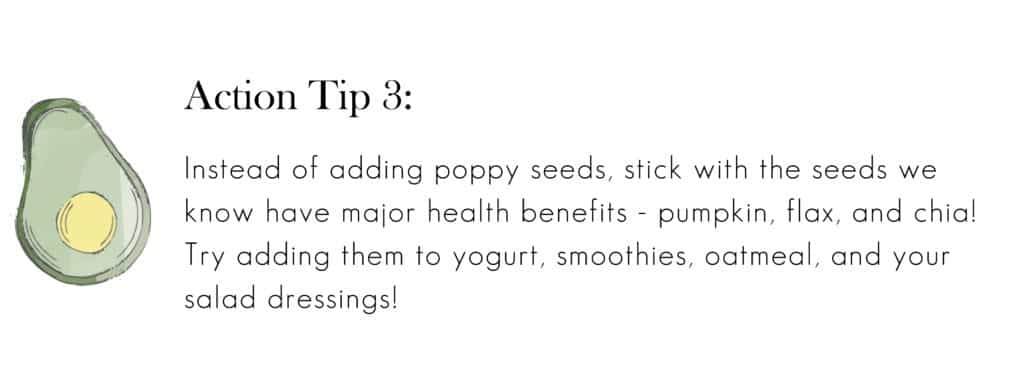
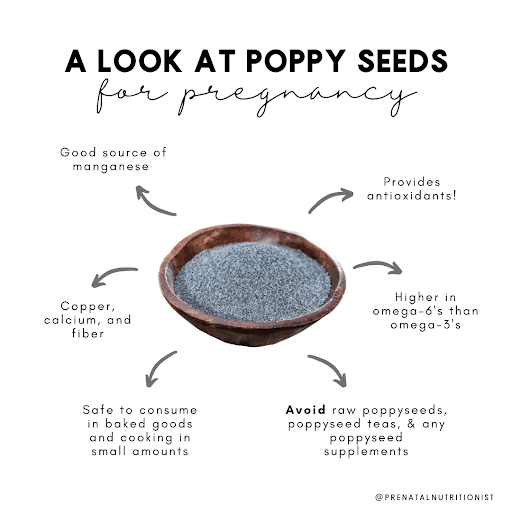
The Bottom Line
- Poppy seeds are from the opium plant, the same plant that is used to produce heavy duty pain relieving drugs like morphine and codeine.
- Poppy seeds in HIGH amounts can actually cause the same effects on your body that morphine can and because of this, consumption should be minimal during pregnancy.
- Daily intake of raw poppy seeds or poppy seed tea is a no-go, but baked goods and treats with poppy seeds added are okay.
- Overall, it’s probably smart to opt for seeds and nuts we know are health-promoting – walnuts, almonds, flax seeds, chia seeds, pumpkin seeds, sunflower seeds, etc.!
Written by: Clare Viglione, MPH, RDN
Reviewed / edited by: Ryann Kipping, MPH, RDN, Owner + Founder







